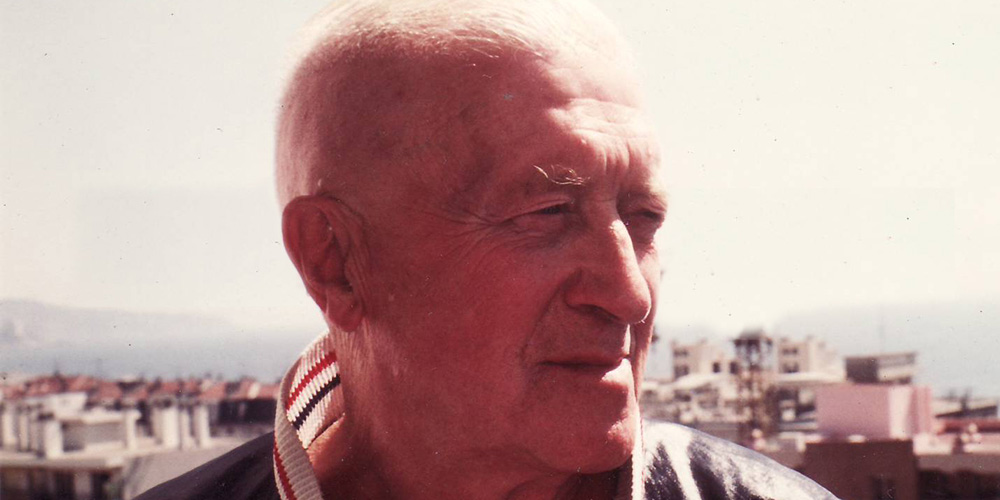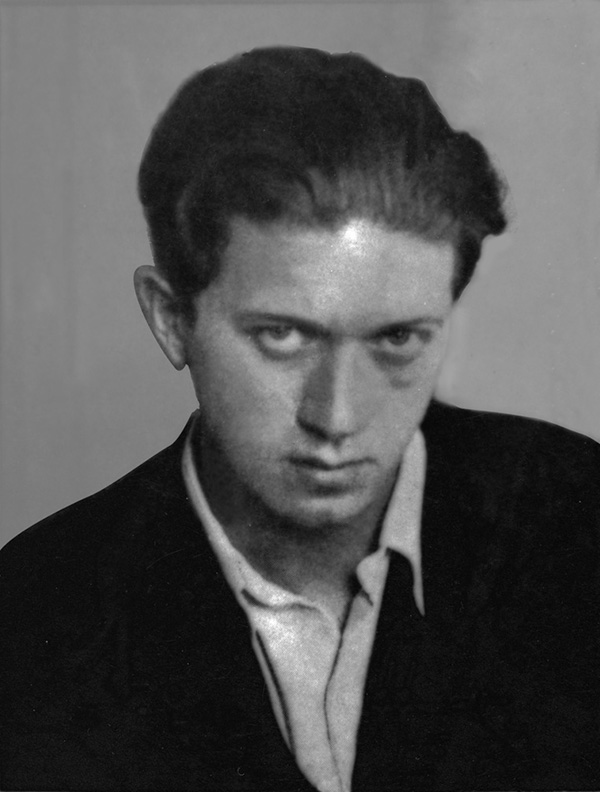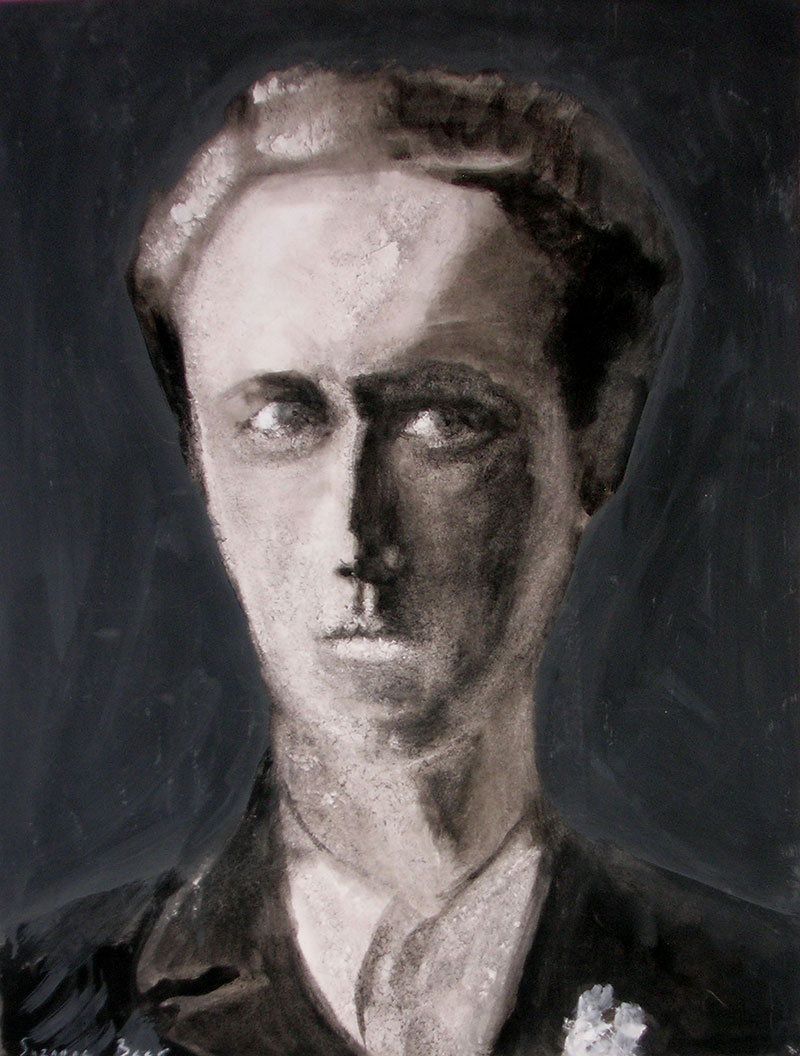Joseph Beer
Composer
(1908-1987)
Board of Advisors
Biography
Compositional Style
What Critics Have Said
Distinguished Board of Advisors
Roberto Alagna, Tenor
Paris, France
Harold Prince, Producer
New York, New York
Maestro David Charles Abell, Conductor
Latest CD: “Forever” starring Diana Damrau
London, United Kingdom
Prof. Gergely Sugar, Wiener Symphoniker
Vienna, Austria
Robert McFarland, International Dramatic Baritone
Philadelphia, Pennsylvania
Bret Werb, Musicologist, U.S. Holocaust Memorial Museum
Washington, DC
Dr. Albrecht Dümling, Chairman, Musica Reanimata
Berlin, Germany
Jill Pasternak, Classical Host, WRTI Classical & Jazz Station
Philadelphia, Pennsylvania
Jussi Främling, Collaborative Pianist
Lempäälä, Finland
Biographical Sketch
- May 7, 1908: Born in Lwow, Poland.
- 1927: Enrolls at the Hochschule für Musik in Vienna where he is permitted to skip the first four year’s training and proceed at the Master’s level. He becomes the protégé of the renowned composer and teacher, Joseph Marx.
- 1930: Graduates Summa cum Laude from the Hochschule für Musik. Professor Marx takes a special interest in him and promotes his early success.
- 1930-1934: Composes various instrumental music, among which the Corelli-Variationen for violin and clarinet, a sonata for cello and piano, a piece for oboe and clarinet and sundry chamber music.Then come orchestral suites, among which the Walzersilhouetten as well as a symphonic ballet, Triptik: Spiritual, Wiegenlied, Tanz about which the great critic Erwin Stein commented: “A hit for any concert hall.” And the young Beer also orchestrates Brahm’s Ballads for piano.Of the above, all are lost to date, safe for the Triptych which was recently found at its former publisher Universal Edition in Vienna and is now available from Doblinger Musik Verlag.
- 1934: Der Prinz Von Schiras, with lyrics by Ludwig Herzer and Dr. Fritz Löhner-Beda, premieres at the Zurich Opera House with international radio broadcast, receiving critical acclaim. Following its successful debut, the work is taken to Salzburg, Vienna (Theater an der Wien), Warsaw (Teatr Wielki), Madrid (Teatro Fontalba), Stockholm, and tours South America with the Luis Calvo Company.
- 1937: Polnische Hochzeit, with lyrics by Alfred Grünwald and Dr. Fritz Löhner-Beda, composed in but a few weeks, also premieres at the Zurich Opera House in 1937. It is subsequently performed on over 40 stages throughout Europe and translated in 8 languages
- 1938: Maurice Lehmann, then director of the Théâtre du Châtelet, schedules Polnische Hochzeit for a French premiere starring the famed stage couple Jan Kiepura and Marta Eggerth. Simultaneously, tenor superstar Richard Tauber is slated to be featured in a high profile Viennese creation. Published by the Stockholm-based Arvid Englind Publishing Co., the work continued to be performed with tremendous success in Scandinavia from 1939 until 2000 despite the composer’s lack of cooperation.
- March 13, 1938: With the Anschluss, Beer’s name is taken off the roster of the Theater an der Wien, and soon the works of the “Jew Beer” are banned from performance.
- 1939: Beer escapes to Nice, France. In hiding, he continues to compose throughout the war without benefit of a piano, hearing all of the instruments of the orchestra in his head.
- 1939: Beer escapes to Nice, France. In hiding, he continues to compose throughout the war without benefit of a piano, hearing all of the instruments of the orchestra in his head.
- 1945: Although bereft of worldly possessions and career, Joseph Beer has survived the Holocaust. But his beloved father, mother, and younger sister, trapped in Lwow at the onset of the war, perished at Auschwitz. And the great Viennese librettist Dr. Fritz Löhner-Beda, Beer’s main colleague, supporter and best friend, had also been murdered.Permanently scarred, Beer recoils from success. He refuses offers from such houses as the Theater an der Wien and the Opéra de Monte-Carlo. He characterizes many of his former colleagues in the music business as Nazi collaborators…
- 1949: Beer’s next stage work, Stradella in Venedig, a comic opera in seven tableaux with interlude, premieres at the Zurich Opera House starring famed Max Lichtegg, tenor & Heinz Rehfuss, bass among others. The opera is critically acclaimed – mentioned by the late Kurt Pahlen in his World Music History (München, Südwest Verlag) as “…a comic opera of the highest sort.”With time, Beer becomes increasingly withdrawn. He severs his ties with the artistic community, yet he continues to compose daily in isolation. He does take time, however, for scholarly research.
- 1966: Beer earns a Doctorate in Musicology with Mention Très Honorable et Félicitations du Jury from the Sorbonne under the direction of famed French musicologist Vladimir Jankelevitch. His thesis topic: “The Evolution of Harmonic Style in the Work of Scriabin.”
- 1949-1987: Beer composes La Polonaise, a Singspiel Opera in three acts, five tableaux and a prologue with a historic subject set in Russia-occupied Poland during the Napoleonic era.
- 1961-1987: Beer composes Mitternachtssonne, a Singspiel Opera in five tableaux, two interludes and a prologue — a magical romance populated by lumberjacks and elf-like creatures called Nissen set in rural Norway of the 1930’s.
- November 23, 1987: Joseph Beer passes in Nice, France.
- 1988-2013: Beer’s late wife, Hanna Beer, along with their two daughters Suzanne and Béatrice Beer, start to actively promote the works of this brilliant composer posthumously.
- 2007-2014: Béatrice Beer, herself a noted soprano, starts to perform her father’s music in concert internationally, in Austria, Germany, in Washington, D.C., New York City, and in the United States — at times in duet with internationally acclaimed dramatic baritone Robert McFarland.
- 2008: Robert McFarland acts as Joseph Beer’s agent and actively promotes him to his colleagues at the top echelon of the classical music world.
- January 2010: Joseph Beer’s music experiences the start of a major renaissance, included among others in a sold out concert at the Théâtre du Châtelet featuring the famed Orchestre Pasdeloup under the baton of Maestro David Charles Abell (who has since recorded a CD with Diana Damrau among others.)
- March 2010: The concert is broadcasted by France’s major classical radio channel France Musique.
- July 2010: Joseph Beer’s music is featured in a special In Memoriam performance during the French Festival Musiques Interdites at the Opéra de Marseille.
- December 2010: the prestigious Viennese publishing house Doblinger Verlag includes Joseph Beer among its prestigious roster of composers.
- July 2012: Polnische Hochzeit sees a Viennese Revival Premiere by the Wiener Operettensommer under the baton of Maestro Charles Prince, son of the legendary producer Harold Prince who is also getting involved.
- April 2013: German premiere of Polnische Hochzeit also led by Maestro Prince.
- 2013-2015: Major members of the international classical music scene start to show interest and to get involved, among others, Piotr Beczala, Roberto Alagna, Maestro Lukasz Borowicz, Maestro Alain Altinoglu, and stage director Harold Prince, while major premieres are in the works as well as recordings.
- November 2015: The world-renowned Munich Radio Orchestra (Münchner Rundfunkorchester) performs and records Joseph Beer’s pre-war “blockbuster” Polnische Hochzeit under the baton of its chief conductor, Leipzig Opera Director Maestro Ulf Schirmer with Chorus from the famed Staatstheater am Gärtnerplatz.
CPO Label Release targeted for Fall 2016.
Jadja: Soprano Martina Rüping — Boleslav: Tenor Nikolai Schukoff — Staschek: Baritone Michael Kupfer-Radecky — Suza: Mezzo-Soprano Susanne Bernhard — Casimir: Lyric Baritone Mathias Hausmann. - Spring 2016: Beer’s Sorbonne doctoral thesis L’Évolution du style harmonique dans l’œuvre de Scriàbine (Harmonic Style Evolution in Scriabin’s Works) is slated for publication by France’s premiere musicology publisher Aedam Musicae — based on a letter by famed musicologist Vladimir Jankélévitch praising the work as the best, most in-depth study of its kind.
- May 2017: Based on Maestro John Mauceri’s recommendation, the London based label Toccata Classics sponsors an all Joseph Beer CD spanning the entire Beer oeuvre, featuring among others International Dramatic Baritone Robert McFarland and the composer’s own daughter, noted Soprano Béatrice Beer. Launch Date: May 2017.For more information, please visit
http://www.JosephBeerComposer.com or
http://www.facebook.com/JosephBeerComposer.
Compositional Style
Overview
Joseph Beer’s inspiration can be can be said to be tri-fold in nature: Slavic (Russian/Polish) with Tchaikovsky, Chopin and Scriabin among others, the Viennese School/German (mainly Brahms and Beethoven but also Mendelssohn and Mahler) and Italian (mainly Puccini.)
Despite his living in France for more than half of his life, the only French composers whose influence can be heard are Ravel mainly, and also Bizet at times.
Traces of jazz and Klezmer and sundry folk influences can also be detected in Beer’s oeuvre, as the composer believed, as some of his predecessors did, such as Brahms etc., that in order to be a bona fide classical composer, a musician had to be first thoroughly acquainted with his popular musical roots and heritage.
Periods
Three periods of compositional inspiration, style and technique emerge from Beer’s work as follows:
1- Youth/Viennese Period: influenced by the Viennese operetta genre in some sense, yet, as Beer’s composition teacher and mentor Josef Marx himself wrote, going far beyond it through the complexity, depth and wealth of compositional genius and technique.
Works are whipped out in a few weeks by an overly gifted, carefree youth who’s been composing since age 7 (starting by trying to invent his own system of musical notation!!) and to whom the art form comes as easy as reading a newspaper!
- Main works of this period are Der Prinz von Schiras and Polnische Hochzeit.
2- War/in Hiding Period: A total shift of inspiration and technique, with a depthening of the intricacy and sophistication of the compositional style and technique.
- Main work: Stradella in Venedig, entitled “Komische Oper” by the composer (and reviewed as a “Comic Opera of the highest sort” by the noted musicologist Kurt Pahlen among others.)
3- Post-War/Maturity Period: Another total overhauling of compositional technique where the great composer is in full mastery of his art and puts forth timeless melodies set to lush, idiosyncratic harmonies, and totally innovative and masterful orchestration.
- Main works: La Polonaise and Mitternachtssonne — composed and finetuned over decades and entitled “Singspiel Oper” by the composer — unpublished.
Conclusion
Beer’s operas are characterized by exquisite, gorgeous arias which remain in the ear — albeit always surprising the listener — set to lush and innovative harmony. They include pieces which are effervescently rhythmical, at times, even jazzy.
Altogether, while stemming from the grand romantic tradition, Beer’s style reflects decidedly modernistic influences as well, while being utterly idiosyncratic and bearing its own griffe.
In sum, the oeuvre reveals a level of inspired craftsmanship which is truly innovative and unique. It can be easily recognized and set apart from all others, revealing the brilliant work of a true composition genius.
What Critics Have Said…
Pre War…
- …The premiere of Der Prinz Von Schiras was given in all its splendor, which means for its young composer, Joseph Beer, an extraordinary success for his very first work… The composer orchestrated sumptuously for instruments and wrote splendid arias for the lead singers, modern yet flourishing… The music is of great dramatic intensity and very good stage-wise.
—Die Stunde, April 5, 1934
- …sensational success of an operetta [Polnische Hochzeit] of grand scale, with fiery melodies and splendid orchestration. An enduring work…
—Das Echo, April 5, 1937
- …certainly a grand operetta with enduring value.
—Neue Wiener Journal, April 5, 1937
- …The operetta Polnische Hochzeit received extraordinary applause!
—Neue Wiener Tagblatt, April 6, 1937
- …[Polnische Hochzeit] doubtless fulfills the compelling desire of all Stadttheatern for a powerfully crafted stage production both as to music and lyrics. It was a formidable success as soon as it premiered, each number had to be encored several times over.
—Bohemia Prag, October 5, 1937
- …With Polnische Hochzeit, everything seems perfect! It has a great ambience, and one is constantly entertained. Its rich treasure of melodies is the great surprise of the evening.
—Brüxer Zeitung, November 2, 1937
- … [Polnische Hochzeit] received a fiery and enthusiastic welcome…
—Die Zeit, Prague, Nov. 10, 1937
- … [Polnische Hochzeit] had an incredible success!
—Mährisch-Ostrauer Morgenzeitung, Dec. 22, 1937
- “…The Czech premiere of … Polnische Hochzeit was an uninterrupted success!
—Olmütz Hlas Lidu, Jan. 26, 1938
Post War
- … Joseph Beer’s music was a delight to listen to. Beer’s music is definitely at par with the finest of composers of the Holocaust epoch, and of the twentieth century period… Béatrice Beer’s performance was breathtaking, her rich, many-colored voice along with exquisite musicianship being the perfect instrument for her father’s wide-ranging and demanding compositions.
—Steve Cohen, Daily News, Philadelphia, Pennsylvania
- The music of this magnificent 20th Century composer whose career was cut short by the Holocaust deserves to be heard worldwide. … Soprano Béatrice Beer … commands the stage with her presence … with such a beautiful voice and solid technique…, [she] is an international talent [who] will electrify … every stage with her performing.
—Robert McFarland, Metropolitan Opera, San Francisco Opera, La Scala, Deutsche Oper Berlin, etc.
- The combination of Joseph Beer’s music with the voice of his own daughter, Soprano Béatrice Beer, herself a world class opera singer, is a unique event which strikes both by its quality and its style – a match made in heaven already making history.
— Newsday, New York, New York
- Beer’s music was a revelation… [Béatrice’s] singing, too, was superb … [We] were privileged to hear some extraordinary music, beautifully and lovingly interpreted.
—Bret Werb, United States Holocaust Memorial Museum, Washington, D.C
- A gifted daughter’s tribute to a gifted father… Soprano Béatrice Beer’s voice has an almost heartbreaking beauty … interpreting the songs of the late composer Joseph Beer… Could there possibly be a more creative, more fitting, more affecting eulogy?
—Ed McCormack, Rolling Stone, New York
- Soprano Béatrice Beer … is an exceptional singer and musician with outstanding vocal technique and interpretative talent. She is doing a great service in reviving … the arias written by her late father, whose operas deserve an important place in the 20th century repertoire…
—Dr. Diana Mittler-Battipaglia, Lehman College, New York, NY
- Béatrice Beer’s music translates into a passion that ignites the spirit! The beauty of the voice is unforgettable, filled with a richness and warmth that extend into the universe like a blessing – the perfect match to this grand music…
—Jennifer Read Hawthorne, Writer, Chicken Soup for the Woman’s Soul





